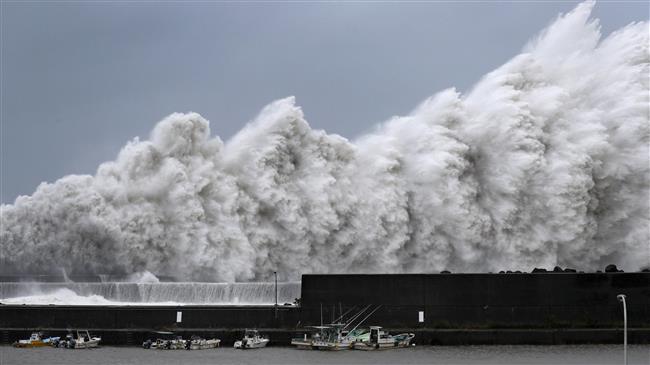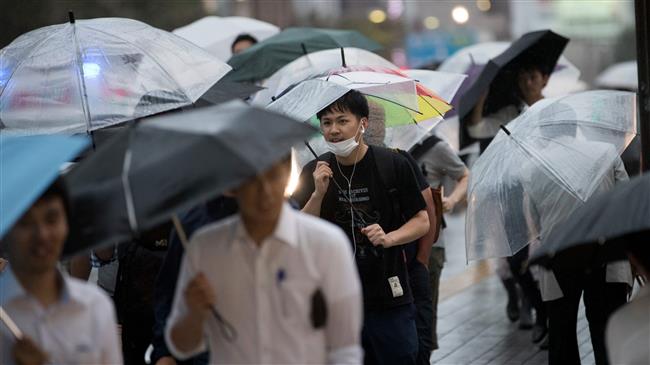Powerful typhoon pounds Japan, dozens injured
A powerful typhoon has pounded Japan's mainland after injuring dozens on outlying islands, bringing transport grinding to a halt and triggering warnings of fierce winds, torrential rain, landslides and floods.
Typhoon Trami has already snarled travel in the world's third-biggest economy, with bullet train services suspended on Sunday, more than 1,000 flights cancelled and Tokyo's evening train services scrapped.
The storm's huge eye was forecast to move near the city of Osaka before churning across the Japanese archipelago, likely hitting areas still recovering from extreme weather that has battered Japan in recent months.
In total, 65 people have sustained minor injuries -- mainly cuts from shattered glass -- and one woman was reported missing in the Miyazaki region, which was drenched by record rainfall and suffered localized flooding. According to local media, the woman in her 60s was swept away by gusts in a gutter while working with her husband in their rice field.
Nationwide, authorities have issued non-compulsory evacuation advisories to 1.5 million residents, according to public broadcaster NHK, urging people across the country to stay indoors.
Nearly 500,000 households in the western region of Kyushu and Okinawa have lost power, local utilities said.
Violent gusts and heavy rain made it impossible to venture outside, said Yuji Ueno, an official in the town of Shirahama in Wakayama prefecture, which was forecast to be right in Trami's path.
"From around 2 p.m., we saw incredible winds and rain. I stepped outside the city hall in the afternoon and the rain was swirling in very strong wind. Enormous wind...It was difficult to stay standing. It was very scary," Ueno told AFP.
The typhoon is not expected to hit the capital head-on, but strong winds and heavy rain are still feared from later Sunday.
Some businesses were already putting up shutters and hunkering down.
Kansai International Airport in Osaka, western Japan, which was heavily flooded by a typhoon last month, said it had closed its runways from 11 a.m. (0200 GMT) on Sunday until 6 a.m. on Monday.
Officials piled up sandbags to avoid a repeat of flooding seen during the previous storm.
Japan Meteorological Agency issued warning of landslides and flooding from possible storm surges.
Cities in the expected path of the typhoon were already taking precautions.

East Japan Railway said it will halt all train services in the Tokyo metropolitan area from 8 p.m. (1100 GMT) on Sunday and operations of some bullet trains were also suspended.
Tokyo Metro announced it will suspend operation of some subway trains from 9 p.m.
Some western regions are still recovering from Typhoon Jebi in early September, the most powerful typhoon to strike the country in a quarter of a century. It claimed 11 lives and shut down Kansai Airport.
Deadly record rainfall hit western Japan earlier this year and the country sweltered through one of the hottest summers on record.
Also in September a magnitude-6.6 earthquake rocked the northern island of Hokkaido, sparking landslides and leaving more than 40 people dead.
Trami is the latest in a string of extreme natural events in Japan, which has suffered typhoons, flooding, earthquakes and heatwaves in recent months, claiming scores of lives and causing extensive damage.
Packing maximum gusts of 216 kilometers (134 miles) per hour, Trami was expected to travel over most of the archipelago, weakening slightly but causing extreme weather into Monday, forecasters said.
Still classed as a "very strong" typhoon, Trami pounded Kagoshima on the western tip of Japan early Sunday, causing minor injuries -- such as cuts from broken windows and people knocked over by gusts.
(Source: Agencies)
Know their names: Palestinian athletes, scouts, coaches killed by Israel in Gaza
'It was not a strike': Iran FM dismisses Israeli weapons as 'children toys'
The struggles of Occupied Palestine
Saadi Day: Ayatollah Khamenei exalts great Persian poet
Iran’s Civil Defense examines country’s preparation for potential threats
FBI chief: Chinese hackers targeting critical US infrastructure
New York Times leaked memo on Gaza coverage reveals obfuscation of facts
VIDEO | Press TV's news headlines














 This makes it easy to access the Press TV website
This makes it easy to access the Press TV website